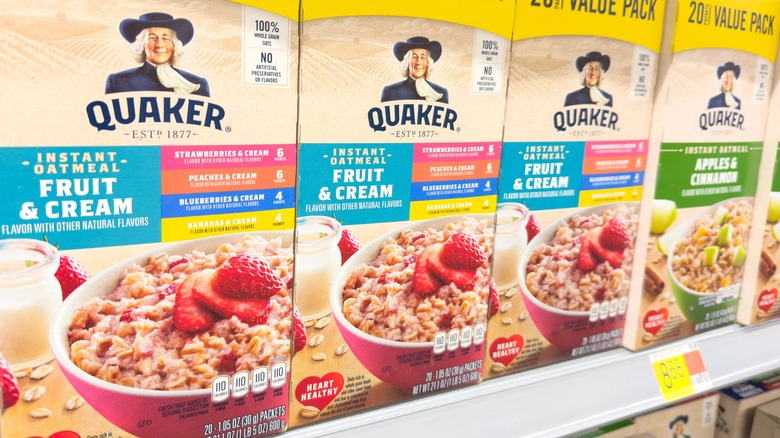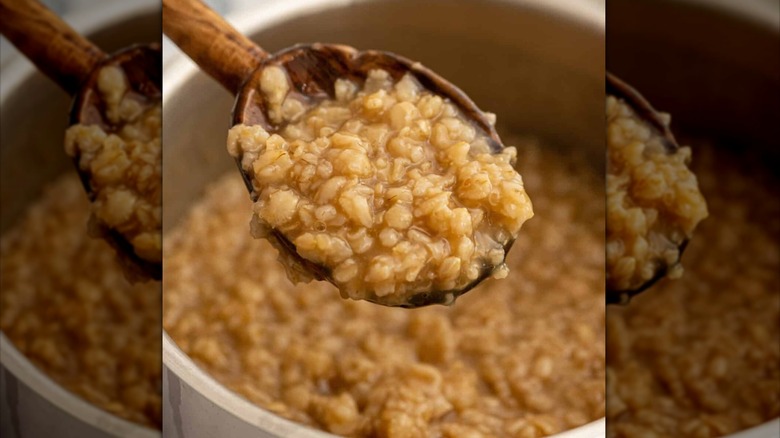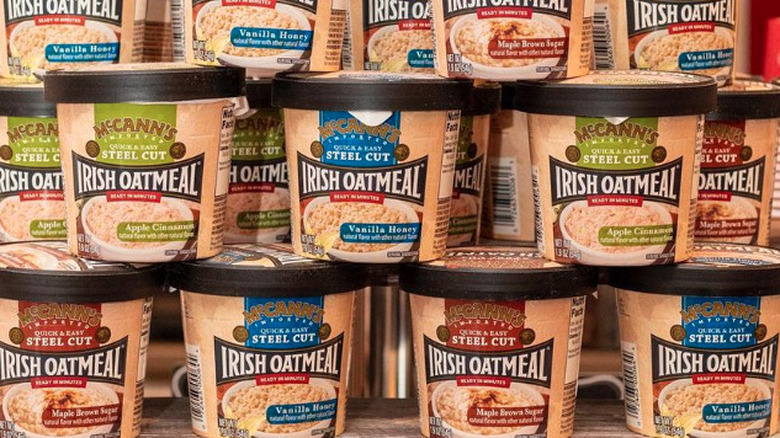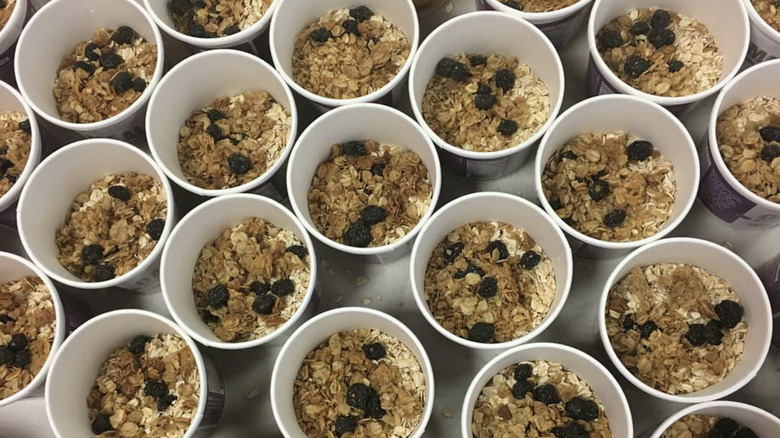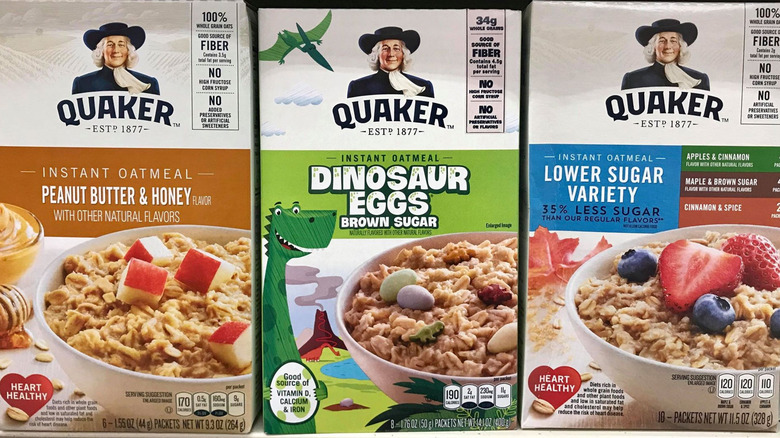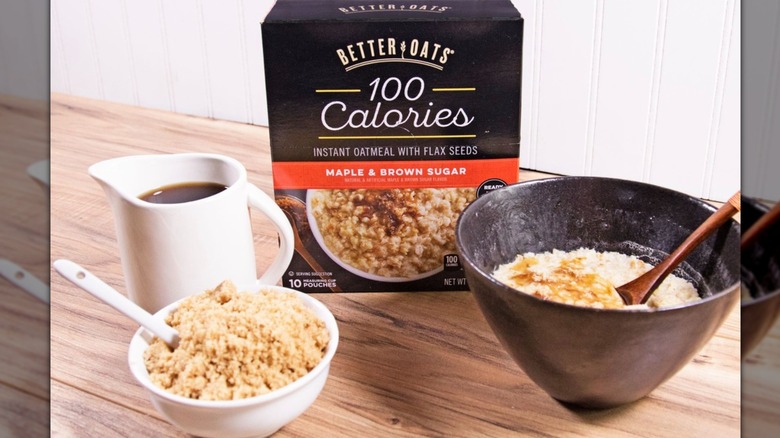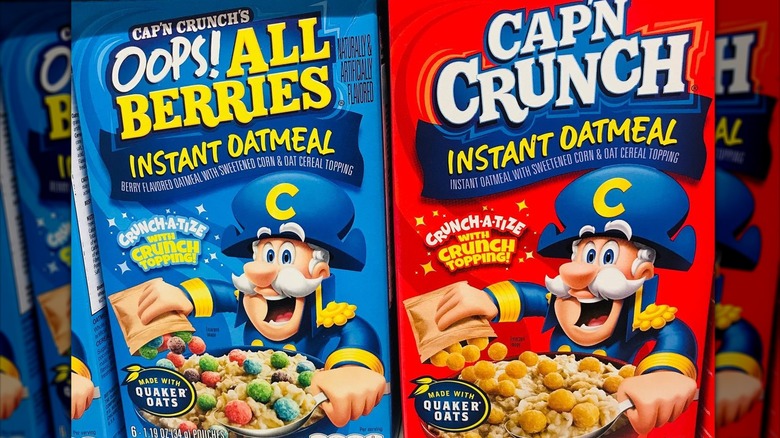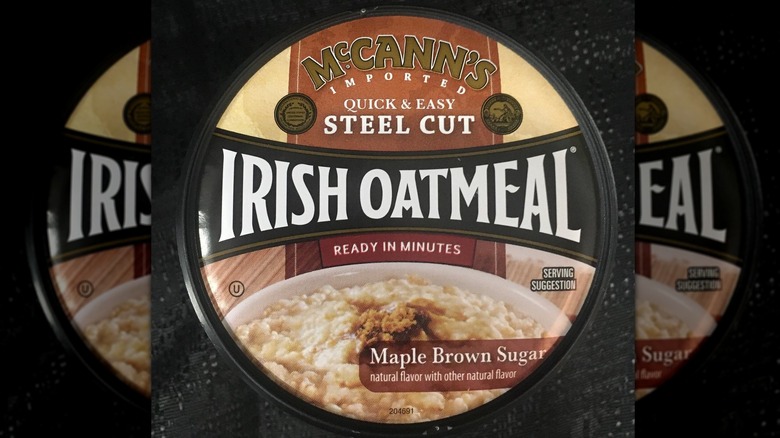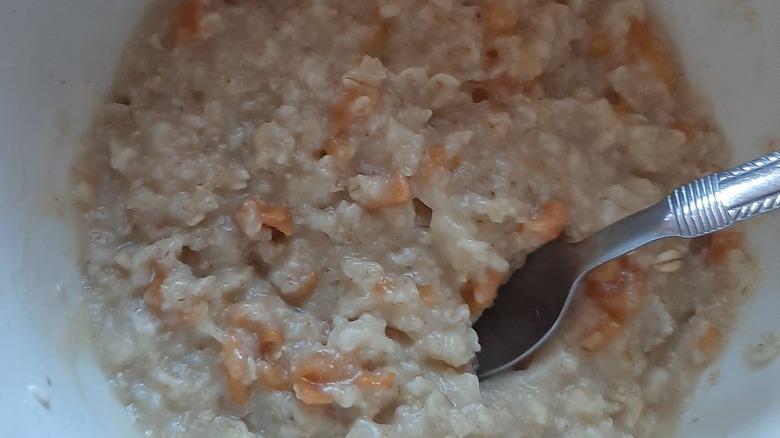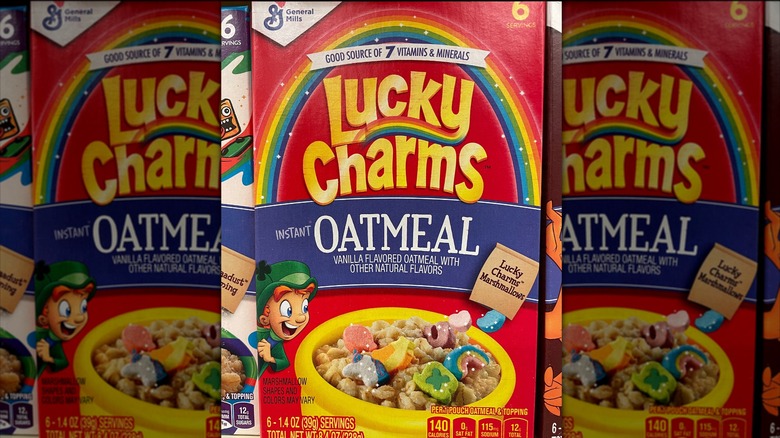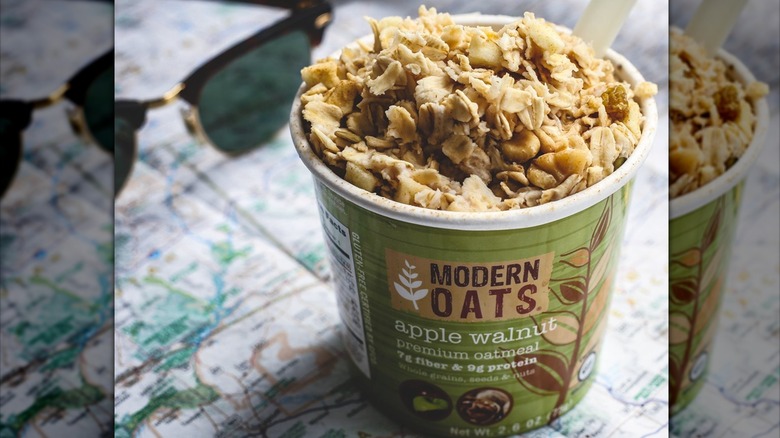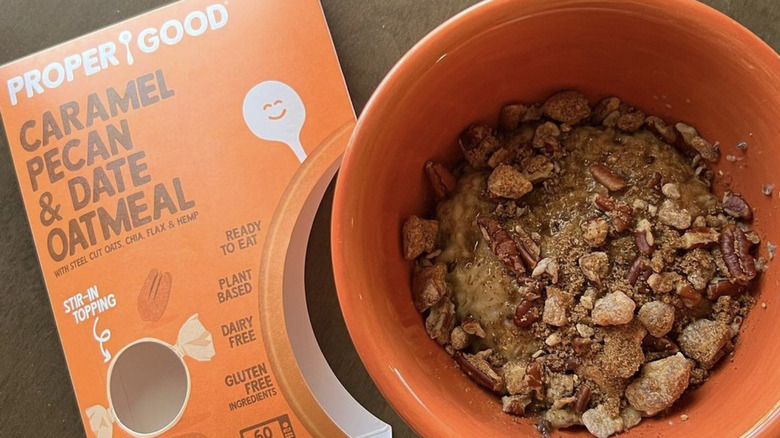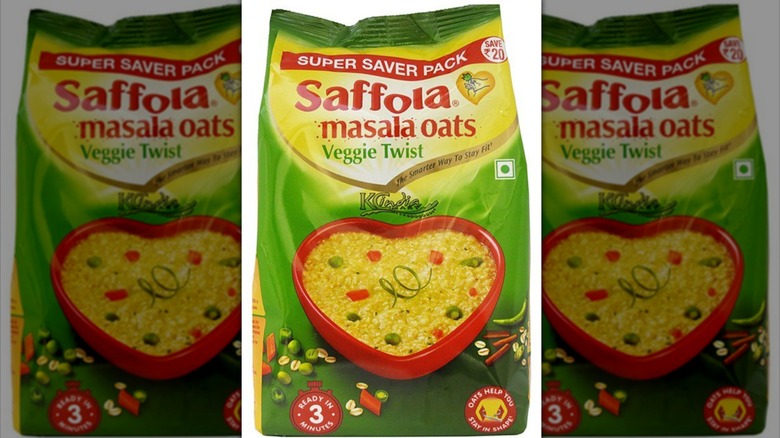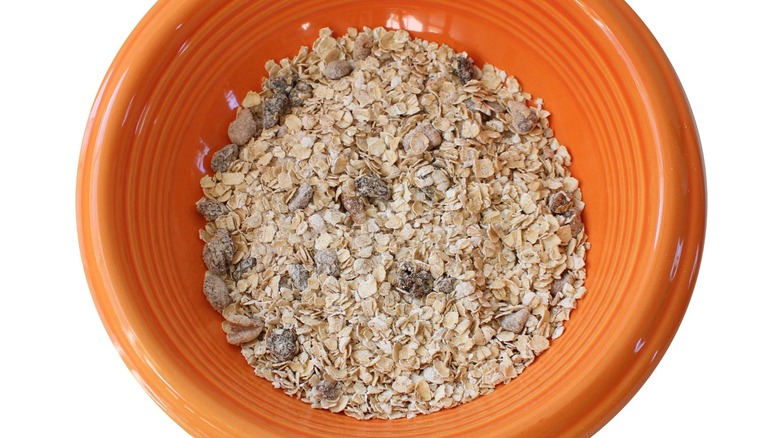12 Unhealthiest Store-Bought Oatmeal You Can Buy
Oatmeal seems innocent enough, but certain brands are undercover calorie bombs, loaded with added sugars, sodium, and in some cases, potentially harmful chemicals. Most of the unhealthiest oatmeal you can buy falls into the instant oatmeal category. These packets are convenient and popular with kids, but a closer look at the nutrition facts and ingredient list might make you think twice about this quick and easy breakfast.
The worst part is, that many boxes of store-bought oatmeal are dressed up like healthy foods. Words like "natural", "better", and "proper" on the packaging can mislead shoppers into thinking certain types of oatmeal are nutritious when they contain as much sugar as a breakfast pastry. Oatmeal is naturally a carb-forward food containing plenty of fiber, vitamins, and minerals. Still, too many brands add sugars and artificial ingredients to a product that would be better off without it. We will explain further what makes some oatmeals unhealthier than others — and how we chose the worst offenders — at the end.
We'll be honest, the best way to avoid the unhealthiest oatmeal on the grocery store shelf is to buy plain oats and add fruit or other natural ingredients to it. That said, we understand that the convenience of pre-flavored oatmeal wins out in certain situations. If instant oatmeal is on your grocery list, but you want to avoid the kinds that are more like junk food than breakfast, think twice about buying the ones on this list.
1. 365 by Whole Foods Market Organic Maple & Brown Sugar Instant Oatmeal
If it's at Whole Foods, it's probably healthy, right? Not exactly. Whole Foods Market is a humongous grocery store chain with plenty of pre-packaged junk food on its shelves. Organic eating is practically a religion at Whole Foods, but when it comes to its store-brand instant oatmeal, organic doesn't equate to healthy.
Whole Foods Market launched its in-house 365 brand in 1997 as a more affordable alternative to the pricy organic food brands the chain is known for. Organic Maple & Brown Sugar Instant Oatmeal is one of thousands of products sold under Whole Foods' 365 label. A single-serve portion of this oatmeal contains 250 calories — a little high for a one-cup serving. The inclusion of pecans contributes to the higher calorie count, but the nutrition facts further reveal a lot of sodium and sugar.
Ingredients like organic cane sugar, organic maple sugar powder, and organic molasses sound sweet — and that's because it is. The 19 grams of sugar inside 365's Organic Maple & Brown Sugar Instant Oatmeal, is added sugar, making up 38% of your daily recommended value. Also thrown into the mix is a whopping 230 milligrams of sodium.
Sodium is a common ingredient in instant oatmeal, but while other brands typically top out at around 200 milligrams per serving, Whole Foods pushes the salt content even higher. Another ingredient in this oatmeal is organic rice maltodextrin. Sure it's organic, but rice maltodextrin is still a chemically engineered additive.
2. McCann's Vanilla Honey Microwaveable Cup
McCann's Oatmeal is as authentic as it gets, and the brand's roots stretch back to 19th-century Ireland. The McCann's name still carries a reputation for quality, and its oatmeal can be found on grocery store shelves worldwide. McCann's claim to fame is its Steel Cut Irish Oats, but the brand offers numerous instant oatmeal flavors as well. Vanilla Honey oatmeal in a microwaveable cup bearing the reputable McCann's name seems like a good oatmeal option, and although it might taste good, it's not a healthy choice.
"Quick & Easy" is another luring attribute on the label of McCann's Vanilla Honey Microwaveable Cup, but if you're trying to watch your sugar or sodium, this might not be the oatmeal for you. A one-cup serving of McCann's Vanilla Honey Instant Irish Oatmeal packs 200 calories, 17 grams of sugar — all of which are added sugars — and 240 milligrams of sodium. Not exactly the stats associated with your typical healthy food.
The ingredients list is also concerning. The fact that McCann's describes its Vanilla Honey oatmeal (and its other flavored oatmeal for that matter), as "naturally flavored with other natural flavors" is a bit of a head-scratcher. The fourth ingredient listed is calcium carbonate, an inorganic salt additive derived from marble stones or egg shells used as a leavening agent, dough conditioner, or fortifying element. The fifth ingredient is guar gum, another additive commonly used in food as a stabilizer.
3. Share Good Foods Blueberry Cobbler Oatmeal
A name like Share Good Foods would lure in a lot of oatmeal lovers. Then again, so would the flavor Blueberry Cobbler. The Share Good Foods brand specializes in — in their words — "high-quality grab-n-go food ideas", and while this is true, the instant oatmeal it sells is one of the unhealthier oatmeal options available to consumers.
Share Good Foods is a coffee house turned commercial product line that began in Denver, Colorado in 2010. The brand uses organic oats and raw sugar to craft its instant oatmeal cups, but the amount of raw sugar inside a single serving errs on the unsettling side. There are 300 calories in a one-cup serving of Share Good Foods Blueberry Cobbler Oatmeal, along with 18 grams of sugar and 280 milligrams of sodium. Ingredients like sunflower seed oil, canola oil, and butter are responsible for the 3 grams of fat, and 0.5 grams of saturated fat.
This oatmeal also brings in a lot of carbs (58 grams), but slightly redeems itself with 9 grams of protein and 7 grams of fiber. Heavy-handed nutrition facts aside, Share Good Foods does fulfill its promise of sticking to high-quality ingredients. Its Blueberry Cobbler Oatmeal doesn't contain preservatives as so many of its competitors do, and it's gluten-free.
4. All Quaker Oatmeal
Maybe you're not exactly sure what a Quaker is, but you know his face. You've seen it since childhood, as one you can count on for a bowl of satisfying oatmeal. Or so you thought. Recently, the Quaker brand (named for a colonial-era Christian group known for their honesty) found itself in hot water ... and not the kind it's used to. The American company is the target of a class action lawsuit after a 2022 study conducted by the Environmental Working Group (EWG) found traces of the pesticide chlormequat in multiple oat-based Quaker products including granola bars and oatmeal.
As of May 2024, chlormequat is legal in the U.S. agricultural industry — unless the plants sprayed with it are sold as food. Of the 13 products EWG tested, the results showed that Quaker's Old Fashioned Oats contained the highest chlormequat levels, with 291 parts per billion (pbb). The EWG notes that foods containing more than 30 pbb can have negative effects on children's growth and the nervous system.
Even if you put the pesticide scandal aside (which is pretty hard to ignore), Quaker, which has been around since the late 1800s, has proffered numerous unhealthy oatmeal varieties for decades. Many of Quaker's instant oatmeal flavors are high in sodium. It's also one of the few brands still peddling instant packets with actual candy inside (we see you dinosaur eggs), a food trend from the '80s and '90s that has since fallen out of favor.
5. Better Oats 100 Calorie Instant Oatmeal
Better Oats is a subsidiary of Post Consumer Brands that specializes in oatmeal. The brand offers organic old-fashioned oats, organic steel cut oats, and several kinds of instant oatmeal. Better Oats' 100 Calorie Instant Oatmeal might lure shoppers with portion control in mind, but what's inside the package isn't the healthy oatmeal you were hoping for.
There are buzzwords all over the front of a Better Oats instant oatmeal box. The company name insinuates that its oatmeal is better than other brands and the promise of 100 calories is front and center. The box also says that this oatmeal contains flax seeds — fiber-rich, heart-healthy oil seeds that are popular in the health food world. Flip the box over and you'll be less excited to learn that the low-calorie, flax-seed-studded instant oatmeal is full of sodium and counts sucralose among its ingredients.
Better Oats 100 Calorie Instant Oatmeal comes in three flavors: Maple & Brown Sugar, Apples & Cinnamon, and Cinnamon Roll. All flavors contain sucralose and over 200 milligrams of sodium. Apples & Cinnamon has the highest sodium count at 240 milligrams while Maple & Brown Sugar and Cinnamon Roll clock in at 210 milligrams each.
There is almost no sugar in these oatmeals — hardly commendable when sucralose is in the picture. Commonly known as Splenda, sucralose is an artificial sweetener and sugar substitute. Sucralose's health risks are minimal, but its presence is a turn-off for those looking to eat natural food.
6. Cap'n Crunch Instant Oatmeal
Cap'n Crunch's bright-eyed face is an anchor of the cold cereal section, yet lo and behold, General Mills has broken into the oatmeal sector. Anyone who loves Cap'n Crunch may be intrigued by how this sweet cereal translates in oatmeal form ... and hey, that's understandable. As far as the diet factor goes, Cap'n Crunch oatmeal is just as unhealthy as its cereal forebears.
Cap'n Crunch's traditional breakfast cereal has long been dogged for containing controversial chemicals like Yellow No. 5 and Yellow No. 6 — the latter is outlawed in Japan — plus loads of corn syrup, and sodium that health-conscious eaters tend to avoid. That said, Cap'n Crunch has over 60 years of familiarity on U.S. grocery store shelves, so giving its instant oatmeal version a try seems pretty harmless. If you can't resist the Cap'n's call, be advised that his oatmeal products are manufactured with the same troubling ingredients.
The oatmeal comes in the original Cap'n Crunch flavor and Cap'n Crunch's Oops! All Berries version. The cereal bits are meant to be sprinkled on top of the freshly microwaved oatmeal. Even if you forgo the sweet and crunchy cereal bits, Cap'n Crunch Instant Oatmeal uses Quaker Oats. Many shoppers see the name Quaker Oats and associate it with a trusted American hot cereal brand, but in reality, Quaker has been at the center of a huge legal scandal for using pesticides in its products not intended for human consumption.
7. McCann's Maple Brown Sugar Microwaveable Cup
Steel cut oats gained ground as a food trend in the late 2000s when Americans on a health kick first embraced this humble Irish oatmeal en masse. To make it, whole oat kernels are cut into small, flat pieces by steel blades. This method makes steel cut oats the least processed form of oatmeal, allowing for slightly higher levels of fiber (and a longer cooking time) than rolled oats. These days, McCann's is one of the most well-known steel cut oatmeal brands. McCann's oatmeal line has grown to include instant oatmeals, resulting in a less-than-healthy version of this Irish classic.
Instant steel cut oats significantly cut down the 20-25-minute cook time of the traditional version, but along with convenience comes a bunch of additives that weren't there before. A one-cup serving of McCann's Maple Brown Sugar Microwaveable Cup has 200 calories, 18 grams of sugar, and 340 milligrams of sodium. That's one more gram of sugar and 100 milligrams more sodium than what's in McCann's Vanilla Honey Microwaveable Cup.
The other ingredients in McCann's instant Maple Brown Sugar flavor don't fare too well either. Preservatives like calcium carbonate and monoglycerides are used to enhance texture. McCann's also adds caramel color to its Maple Brown Sugar oatmeal. This color enhancer is made from high-dextrose corn syrup and ammonium compounds, acids, or alkalis. Caramel coloring with ammonia contains 2-methylimidazole and 4-methylimidazole — both contaminants are known carcinogens.
8. Wegmans Peaches & Cream Instant Oatmeal
Store-brand instant oatmeal packets are affordable pantry picks, perfect for those mornings when breakfast needs to be hassle-free. All too often, grocery store foods designed to be prepared and eaten quickly rely on preservatives and other artificial additives. Wegmans Peaches & Cream Instant Oatmeal is one store-bought version that is far from natural.
Oats and peaches come from the earth, but their essence gets lost in Wegmans' highly processed instant oatmeal. The most glaring shortcut Wegmans takes is not using peaches at all. Those little "peach" bits you're eating are dried apples treated with artificial flavor, citric acid, sulfites, and annatto color. There's not much resembling real cream in this oatmeal either. Standing in for cream are maltodextrin, vegetable oil (a coconut oil and palm oil hybrid), whey, sodium caseinate, and dipotassium phosphate.
Love peaches and cream oatmeal but want to skip trying to figure out which lab-made ingredients within it might be bad for you? We suggest cooking up some plain oatmeal, adding real peaches and a touch of milk or cream. It won't take much longer to prepare than instant and will be a whole lot healthier.
9. General Mills Lucky Charms Instant Oatmeal
Lucky Charms is an American cereal that dates back to 1964, but General Mills' foray into the oatmeal market is much more recent. To keep up with the cereal's easily recognizable flavor profile, Lucky Charms oatmeal uses vanilla-flavored instant oats. The pastel-colored marshmallows are integrated as an oatmeal topping meant to be added after the oats are ready to eat. Lucky Charms in oatmeal form is a little strange, yet classic marshmallow shapes like the red balloon, shamrock bowler hat, purple horseshoe, and tri-colored rainbow make this novelty feel more familiar.
It's not much of a surprise that Lucky Charms oatmeal is as equally unhealthy as the sweet treat cereal it mimics. Artificial food dyes like Red 40, Yellow No. 5, Blue 1, and caramel color are still used in the marshmallows, Unhealthy additives like corn syrup and dextrose also make the ingredients list. Out of the 12 grams of sugar, 11 are added sugars. A single serving also adds 115 milligrams of sodium. Lucky Charms' 140-calorie pouch of instant sweetness should be reserved for sporadic occasions, rather than a go-to breakfast option.
10. Modern Oats Apple Walnut Premium Oatmeal
Modern Oats effectively uses the front of its packaging to draw attention to its oatmeal's redeeming qualities. We can merely scan the wording on a paper cup of Modern Oats Apple Walnut Premium Oatmeal to learn that the oatmeal is all-natural and boasts 7 grams of fiber and 9 grams of protein. Not bad ... but there's more.
Although Modern Oats Apple Walnut Premium Oatmeal is vegan and gluten-free, one 75-gram container holds 300 calories, 7 grams of fat, and 15 grams of sugar — with 12 of those grams being added sugar. Much of the fat and calorie content undoubtedly comes from the walnuts, but there's a lot of sugar in that single-serve cup, which makes calling this oatmeal healthy a hard sell. On the other hand, Modern Oats Apple Walnut Premium Oatmeal is a better choice than most of the unhealthy oatmeals on this list. There is zero sodium and zero chemical preservatives, two nutritional areas where other instant oatmeals fail miserably.
11. Proper Good Caramel, Pecan, & Date Instant Oatmeal
A brand name like Proper Good and a flavor like Caramel, Pecan, & Date sounds appealing, but this oatmeal happens to be one of the unhealthiest picks at the store. Proper Good's precooked, shelf-stable oatmeal launched in 2021 after founder siblings Christopher and Jennifer Jane received investment backing from their appearance on "Shark Tank". Proper Goods is marketed as a healthy food line, yet the oatmeal presents some contradictions.
An 8-ounce serving of Proper Good Caramel, Pecan, & Date Instant Oatmeal with 1.1 ounces of stir-in topping has 310 calories and 12 grams of fat. Proper Good doesn't hold back on the sugar or sodium either. One serving of this oatmeal brings 16 grams of sugar and 300 milligrams of sodium to the breakfast table.
Steel cut oats, chia and flax seeds, and hemp hearts sound great on paper, but when spooned together with more sodium than a Pillsbury crescent roll and as much sugar as two dark chocolate-covered marshmallows from Trader Joe's, the benefits fade out of focus. Most people wouldn't reach for a crescent roll or bite into a chocolate-encased marshmallow and call it a healthy breakfast. Yet Proper Good is just one of numerous oatmeal brands peddling unhealthy instant oatmeal varieties in cleverly worded packaging that can mislead shoppers.
12. Saffola Masala Oats
Savory oatmeal isn't necessarily the first thing that comes to mind when you think of store-bought oatmeal, but it's a popular way to enjoy hot cereal in many cultures. Saffola Masala Oats is a perfect example. Saffola Masala Oats are common at Indian grocery stores and online marketplaces. Masala, an Indian spice blend, is a robust flavor experience, unfortunately, Saffola's quick-oats version is full of salt.
Saffola Masala Oats are available in different flavors, like Peppy Tomato and Veggie Twist. These instant oats are imported from India and come in different-sized packages, but a single serving of the Veggie Twist flavor (the serving suggestion is approximately half a cup) packs 936 milligrams of sodium. Saffola brands its Masala Oats as a healthy snack that helps you stay fit, but the ingredients don't read as healthy to us. In addition to the salt content, manmade flavor enhancers like INS 627 and INS 631 — glutamate additives similar to MSG — are part of the ingredient list.
Methodology
We compared the nutrition facts and ingredient lists of several oatmeal brands and flavors to narrow down which 12 were the unhealthiest ones you can buy. The search was quickly dominated by instant oatmeal. On its own, oatmeal is healthy, but once it gets super-processed — pumped with sugar, salt, and chemical additives — the nutritional benefits are harder to find.
These processing methods are the main problem with instant oatmeal. With that in mind, we began zoning in on which brands and flavors were particularly high in calories, added sugar, and sodium. Oatmeals that contained numerous unnatural ingredients, like additives, artificial coloring, and other preservatives in addition to lots of sugar and salt were placed on our list. Oatmeals with low-quality ingredients or ingredients linked to cancer or other health problems are also among the unhealthiest.
